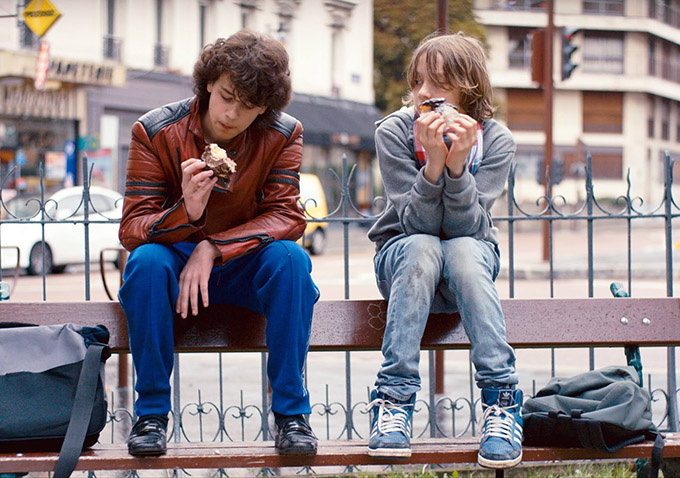 There’s almost no limit to the imagination of director Michel Gondry (“Eternal Sunshine of the Spotless Mind,” “The Science of Sleep”), and as the incessantly precious whimsy of last year’s intolerable “Mood Indigo” made clear, that’s not always a good thing. It’s refreshing then, that for his latest film, “Microbe & Gasoline,” the director tones down his usual quirky, ‘look-at-me’ visual spectacle, for a low-key tale. Two eighth-graders strike up a fast friendship, and in order to escape their equally unhappy circumstances, they build a makeshift house-car, setting out on a road trip through the rural countryside. A charming coming-of-age saga in which Gondry channels his usual preoccupations through the prism of a Truffaut-esque tale of iconoclasts in search of themselves and their place in the world. For the acclaimed French auteur, less is usually more.
There’s almost no limit to the imagination of director Michel Gondry (“Eternal Sunshine of the Spotless Mind,” “The Science of Sleep”), and as the incessantly precious whimsy of last year’s intolerable “Mood Indigo” made clear, that’s not always a good thing. It’s refreshing then, that for his latest film, “Microbe & Gasoline,” the director tones down his usual quirky, ‘look-at-me’ visual spectacle, for a low-key tale. Two eighth-graders strike up a fast friendship, and in order to escape their equally unhappy circumstances, they build a makeshift house-car, setting out on a road trip through the rural countryside. A charming coming-of-age saga in which Gondry channels his usual preoccupations through the prism of a Truffaut-esque tale of iconoclasts in search of themselves and their place in the world. For the acclaimed French auteur, less is usually more.
Boasting a jaunty score that contributes to its ramshackle, off-the-cuff atmosphere, “Microbe & Gasoline” opens by concentrating on glum Daniel (Ange Dargent), whose small size has earned him the derisory nickname “Microbe,” and who fruitlessly pines for taller beauty Laura (Diane Besnier). Awkward and alienated from his unkind peers, Microbe lives with his overprotective mother (Audrey Tautou) and causes youthful trouble with his younger brother, finding little solace or companionship wherever he turns. He channels those tumultuous feelings into art, with paintings of his punk-rock brother and his mates receiving a gallery show, and his line drawings of nude women (which, hilariously, his mom eventually discovers) serving as his homemade pornography. Although Microbe is so internally and externally frustrated that he can’t properly “finish” during self-gratification.

Microbe’s bottled-up situation takes a turn for the better with the arrival of Théo Leloir (Théophile Baquet), a wiseass new classmate with big poofy hair, a red plastic biker jacket, and a souped-up motorbike that compels others to derisively dub him “Gasoline.” Given that Gasoline’s home life consists of being berated by his wheezing, overweight mother and condescending father, it’s not long before he and Microbe bond over their kindred outcast status. Shortly thereafter, Gasoline locates a scooter engine at a local scrapyard and has an epiphany: they can construct a car to flee their families for greener pastures. When he fails to get the proper permits for his made-from-junk vehicle, Microbe has an even more inspired idea: to use a toolshed, rather than a normal car frame, to build an ambulatory house (replete with an exterior flower box for added authenticity) that’ll allow them to drive about the country undetected by the police.
That project is in keeping with Gondry’s lifelong affinity for DIY creativity, which frequently manifests itself via his organic, non-computerized special effects, and which he’s previously celebrated in movies like the amateur-movie-remake comedy “Be Kind Rewind.” There’s a tactile, formed-with-one’s-hands quality to Gondry’s fantasticalities that’s echoed in Microbe and Gasoline’s mechanical ingenuities. The fact that cell phone GPS systems are decried by Gasoline (who defiantly proclaims that it’s still “The Age of Paper!”), and a mobile phone is literally crapped on by Microbe, further emphasizes the film’s belief that low-tech inventions, born from everything-but-the-kitchen-sink resourcefulness, are the most glorious means of escaping life’s doldrums.

Along their journey, the duo clash with a clingy dentist, Microbe gets a ‘shaved-down-the-middle’ samurai haircut at a Korean whorehouse, and the comrades spar over an impromptu detour to rendezvous with Laura. Throughout, Gondry shoots the pair’s misadventures in loose, jazzy handheld that’s always highly attuned to his subjects’ camaraderie and insecurities. Marked by unassuming framing that expresses his characters’ blood-brother kinship, as well as generates droll humor (a selfie taken by two cops in front of the vehicle that Gasoline inadvertently photobombs), Gondry’s direction is assured without ever being showy. That’s also, ultimately, true of his fantastic leads. Buoyed by a script brimming with authentic back-and-forth ribbing and confessional exchanges, newcomers Baquet and Dargent exhibit an alternately ribald and frank rapport that, like the film itself, taps into the volatile anxiety of finding one’s self. It also conveys, courtesy of a climactic punch to the face, the resilient loyalties often formed in the process. [B+]
Check out the rest of our coverage from the 2015 New York Film Festival by clicking here.

